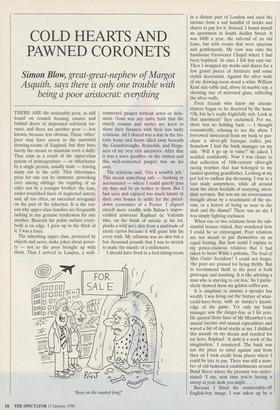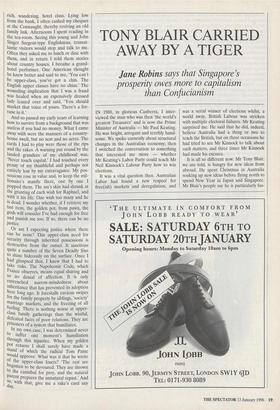COLD HEARTS AND PAWNED CORONETS
Simon Blow, great-great-nephew of Margot
Asquith, says there is only one trouble with being a poor aristocrat everything
THERE ARE the noticeably poor, as still found on council housing estates and behind doors of depressed red-brick ter- races, and there are another poor — less known, because less obvious. These 'other' poor may have access to the ancestral drawing-rooms of England, but they have barely the means to maintain even a daily. They exist as a result of the upper-class system of primogeniture — or inheritance by a single person, usually male — leaving many out in the cold. That inheritance prize for one can be immense, provoking envy among siblings: the toppling of an elder son by a younger brother; the lean, under-nourished faces of neglected sisters; and, all too often, an unearned arrogance on the part of the inheritor. It is the rea- son why upper-class families are frequently lacking in any genuine tenderness for one another. Beneath the polite surface every- body is on edge. I grew up in the thick of it. I was a loser.
The inheriting upper class, protected by objects and acres, make jokes about pover- ty — not so the poor brought up with them. Thus I arrived in London, a well- connected pauper without acres or delu- sions. Gone was any naive faith that the stately cousins and uncles are keen to share their finances with their less lucky relations. All I shared was a stay in the his- toric home and hours idled away beneath the Gainsboroughs, Reynolds, and Hopp- ners of my very rich ancestors. After that it was a wave goodbye on the station and this well-connected pauper was on his own.
The relations said, 'Get a sensible job.' This meant something safe — banking or accountancy — where I could quietly pass my days and be no bother to them. But I had seen and enjoyed too much luxury in their own homes to settle for the pared- down economies of a Pooter. I aligned myself more readily with Balzac's impov- erished aristocrat Raphael de Valentin who, on the brink of suicide at his lot, plucks a wild ass's skin from a multitude of exotic curios because it will grant him his every wish. My talisman was no skin but a few thousand pounds that I was to stretch to make the mantle of a millionaire.
I should have lived in a bed-sitting-room Been on the market long?' in a distant part of London and used the income from a sad handful of stocks and shares to pay for it. Instead, I found myself an apartment in South Audley Street. It was £600 a year, the tail-end of an old lease, but with rooms that were spacious and gentlemanly. My view was onto the handsome Grosvenor Chapel where I had been baptised. At once I felt less cast out. Then I swapped my stocks and shares for a few grand pieces of furniture and some stylish decoration. Against the silver walls of my drawing-room stood a white William Kent side-table and, above its marble top, a shooting star of mirrored glass, reflecting the silver walls.
Even friends who knew my circum- stances began to be deceived by the hoax. `Oh, but he's really frightfully rich. Look at that apartment!' they exclaimed. For me, there was no holding back — I thought romantically, refusing to see the abyss. I borrowed unsecured from my bank to pur- chase a silver-gilt baroque coffee pot. Somehow I had the bank manager on my side. Will it go up in value?' he asked. I nodded confidently. Now I was closer to that collection of 18th-century silver-gilt racing trophies that had belonged to my landed sporting grandfather. Looking at my pot led to endless day-dreaming. I was in a vast study somewhere, while all around went the silent footfalls of scurrying, atten- dant servants. But was my sin covetousness brought about by a resentment of the sys- tem, or a horror of being so near to the drab and the dismal? There was no sin; I was simply fighting exclusion.
When one or two relations from the sub- stantial houses visited, they wondered how I could be so extravagant. Poor relations are not meant to put themselves on an equal footing. But how could I explain to my pence-cautious relatives that I had taken to heart Wilde's polemic, The Soul of Man Under Socialism? I could not forget, `the poor are praised for being thrifty. But to recommend thrift to the poor is both grotesque and insulting. It is like advising a man who is starving to eat less.' So I partic- ularly showed them my golden coffee-pot.
It is simplistic to assume a spender has wealth. I was living out the fantasy of what- could-have-been, with an insider's knowl- edge of the game. Yet only my bank manager saw the danger-line as I hit zero. He quoted those lines of Mr Micawber's on annual income and annual expenditure and waved a list of dead stocks at me. I disliked this assault on my dream and reached for my hero, Raphael. 'A debt is a work of the imagination,' I countered. The bank was not the place to rebel against and from then on I took credit from places where I could be late to pay. There was still a num- ber of old-fashioned establishments around Bond Street where the pressure was under- stated: 'I say, next time you're having a sweep at your desk you might . . .
Because I fitted the comfortably-off English-boy image, I was taken up by a rich, wandering, hotel class. Lying low from the bank, I often cashed my cheques at the Connaught, thereby reviving an old family link. Afternoons I spent reading in the tea-room. Seeing this young and John Singer Sargent-type Englishman, transat- lantic visitors would stop and talk to me. Often they asked me to lunch or dine with them, and in return I told them stories about country houses. I became a grand- hotel performer. One American thought he knew better and said to me, 'You can't be upper-class, you've got a chin. The English upper classes have no chins.' The wounding implication that I was a fraud was healed when an expensively dressed lady leaned over and said, 'You should market that voice of yours. There's a for- tune in it.'
And so passed my early years of learning how to survive from a background that was useless if you had no money. What I came away with were the manners of a country- house swell, but no seat and no acres. The cards I had to play were those of the rips and the rakes. A warning put round by the landed grandees of my childhood was, `Never touch capital.' I had touched every penny of my thimbleful and perhaps not entirely lost by my extravagance. My pos- sessions rose in value and, to keep the mil- lionaire's mantle there, one by one I Popped them. The ass's skin had shrunk at the granting of each wish for Raphael, and with it his life. One wish too many and he is dead. I wonder whether, if I retrieve my last item, the golden pot, from pawn, the gods will consider I've had enough for free and punish me too. If so, there can be no justice.
Or am I expecting justice where there can be none? This upper-class need for security through inherited possessions is destructive from the outset. It sanctions quite a number of the Seven Deadly Sins to shine hideously on the surface. Once I had glimpsed that, I knew that I had to take risks. The Napoleonic Code, which France observes, means equal sharing and s0 no denial of affection. It is only entrenched narrow-mindedness about inheritance that has prevented its adoption here long ago. It forestalls envious swipes for the family property by siblings, 'society' marriage markets, and the freezing of all feeling. There is nothing worse at upper- Class family gatherings than the wistful, defeated faces of poor relations. They are prisoners of a system that humiliates. In my own case, I was determined never to suffer one moment's humiliation through this injustice. When my golden pot returns I shall surely haVe made a stand of which the radical Tom Paine Would approve. What was it that he wrote of the upper-class losers? 'The rest are begotten to be devoured. They are thrown to the cannibal for prey, and the natural parent prepares the unnatural repast.' And 0, with that, give me a rake's card any day.







































 Previous page
Previous page